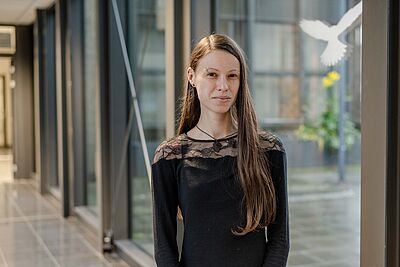The era of so-called "data capitalism" is upon us: Whenever we use digital services, data is collected about us without our knowledge. As users, we are often not in control of our privacy. There is a lack of informational self-determination. Karola Marky researches this topic in her research group "Digital Sovereignty" at the chair for Human Centred Security (HCS). She has been appointed as a professor at the Faculty of Computer Science at the Ruhr University in Bochum in December 2022 and is PI within Research HUB D "Usability" at the Cluster of Excellence CASA.
"Information that we share can be used to influence our behavior," explains the researcher." In the digital world, it could be used in targeted advertising, such as suggestions based on your search history while shopping online. "This is quite useful. But it can also lead to me buying something I would never have bought otherwise. In the worst case, you can lose your freedom because of this influence. Unfortunately, as humans we are all prone to these things, "Marky says.
Turning Dry IT Security Into Fun Stuff
Marky's research focuses on the psychological underpinnings of people's behavior to develop mechanisms to protect them from being manipulated. She wants to investigate more realistic IT security usage scenarios using innovative methods such as virtual reality. With a creative approach, she aims to make IT security more personal and accessible. One example is her use of a 3D printer to create figurines for two-factor authentication. "I printed a cat that you have to touch in a certain way for login, but it could be almost any shape," she says. "IT security can be slightly dry. Stuff like that could make it cooler."
Solo Backpacking Instead of Studying
It is this kind of out-of-the-box thinking that characterizes the young scientist, who took a three-year break from university life after completing her bachelor's degree in Applied Computer Science at the Technical University of Kaiserslautern. She backpacked around the world and worked in a space station laboratory in Japan during this time. She then moved to Darmstadt, where she later completed a doctorate at the Telecooperation Laboratory. This was followed by a post-doctoral position at the Glasgow Interactive Systems (GIST) research unit at the University of Glasgow, Scotland. Before joining the RUB, she was an assistant professor in the Empirical Information Security Lab at Leibniz Universität Hanover. With more than 50 publications in her field of research, she has already built up an international reputation.
Having lived and worked abroad has had many positive effects, she says. "For one thing, I had to learn to be very economical with resources. This is also important in science. On the other hand, I was able to make a lot of contacts in the industry," says the scientist, who is now a long-term external cooperation partner of the Keio University in Japan, and adds: "I am open-minded when it comes to joint projects and other cultures. That helps a lot in terms of teamwork. During these trips, I experienced being the 'foreigner' and had to deal with integration and cultural differences. This is something I think everyone should have experienced at some point".
Learn more about Karoly Marky in this interview.
General note: In case of using gender-assigning attributes we include all those who consider themselves in this gender regardless of their own biological sex.


